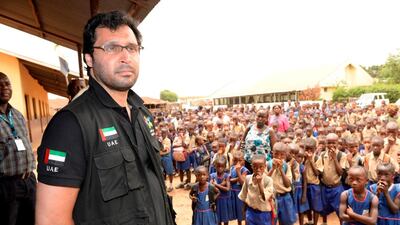Despite recent progress in development and education, Sierra Leone remains one of the poorest countries in the world, according to the UN Human Development Index. The Ebola virus wreaked havoc in this environment and claimed thousands of lives in just two years.
The social and economic consequences of the Ebola outbreak extended beyond the immediate tragedy as the country’s economy suffered enormously. Daily life for the ordinary Sierra Leonean came to a halt, trade slowed dramatically and goods and services became scarce.
The tragedy also moved beyond city dwellers, as the UNDP estimates the percentage of farmers impacted to be 63.6 per cent. The negative impact on farmers was then translated to food insecurity for the nation as a whole.
Many schools were closed all over Sierra Leone to mitigate the risk of transmission.
Closure periods were approximately nine months during the crisis, leaving nearly 1.8 million children without access to comprehensive education, stalling their learning, and threatening the future growth and potential of Sierra Leone’s future generations. According to Unicef, Ebola claimed the lives of 181 teachers and 945 students.
Additionally, the Ebola crisis swiftly and dramatically reversed the improvements made in education services since the country’s 1991-2002 Civil War.
The improvements mainly addressed expansion in education services and eliminating education access barriers. To compensate for the missed learning opportunities, Sierra Leone schools opened in 2015 with an accelerated curriculum to shorten the duration of academic years.
To address this pressing issue, Dubai Cares launched Education in Emergencies: Evidence for Action (3EA), a programme in partnership with the International Rescue Committee.
The programme aims to strengthen the quality of education by improving teaching methodologies, ways to monitor and mentor staff, and reinforcing teaching styles that improve classroom performance. It includes a set of eight core competencies such as varying instruction methods to suit the learner, creating an intellectually stimulating classroom environment, using positive communication techniques (encouraging students, creating a sense of belonging, and promoting positive social relationships), along with effective collaboration with parents, community and other stakeholders.
Barnadetta Sheriff, a head teacher in Gerihun, notes: “This programme is very necessary. I now feel I am able to handle a lot of management issues in a much more professional way. Also, as the head teacher, core competencies will really help me in assessing myself and my teachers. My collaboration with the community will also become more solid and I hope this programme will grow from strength to strength with our full involvement.”
This programme reinforces the concepts of reflection and accountability to make learning more effective in schools. It helped set in place a steady course of recovery from the Ebola crisis as it allowed children to return to their education in an improved learning environment.
Andrew Christian Gbao, a head teacher in Yamandu, describes the ways in which increased school management has led to greater student success: “We now have the skills to manage our schools well, and are able to collaborate better with the community. This will make our work easier. The Dubai Cares programme has arrived at the right time, as an efficient and improved learning environment will help children continue their education after the Ebola crisis”.
International Rescue Committee is a humanitarian aid and development organisation

